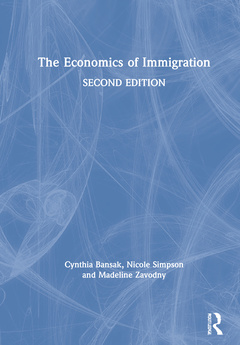The Economics of Immigration (2nd Ed.)
Auteurs : Bansak Cynthia, Simpson Nicole, Zavodny Madeline

This book, in its second edition, introduces readers to the economics of immigration, which is a booming field within economics. The main themes and objectives of the book are for readers to understand the decision to migrate, the impacts of immigration on markets and government budgets and the consequences of immigration policies in a global context. Our goal is for readers to be able to make informed economic arguments about key issues related to immigration around the world.
This book applies economic tools to the topic of immigration to answer questions like whether immigration raises or lowers the standard of living of people in a country. The book examines many other consequences of immigration as well, such as the effect on tax revenues and government expenditures, the effect on how and what firms decide to produce and the effect on income inequality, to name just a few. It also examines questions like what determines whether people choose to move and where they decide to go. It even examines how immigration affects the ethnic diversity of restaurants and financial markets.
Readers will learn how to apply economic tools to the topic of immigration. Immigration is frequently in the news as more people move around the world to work, to study and to join family members. The economics of immigration has important policy implications. Immigration policy is controversial in many countries. This book explains why this is so and equips the reader to understand and contribute to policy debates on this important topic.
Part I: Background on Immigration
Chapter 1: Why Study the Economics of Immigration?
Chapter 2: Patterns of International Migration
Chapter 3: Determinants of Immigration
Part II: Immigrant Selection and Assimilation
Chapter 4: Selection in Immigration
Chapter 5: Assimilation
Chapter 6: The Second Generation
Part III: Labor Market Effects of Immigration
Chapter 7: Labor Market Effects of Immigration: Theory
Chapter 8: Labor Market Effects of Immigration: Evidence
Part IV: Other Effects of Immigration
Chapter 9: Effects on Other Markets in the Destination
Chapter 10: Fiscal Effects
Chapter 11: Effects on Source Countries
Part V: Frontiers in Immigration Research
Chapter 12: Frontiers in the Economics of Immigration
Part VI: Immigration Policy
Chapter 13: U.S. Immigration Policy
Chapter 14: Immigration Policy around the World
Cynthia Bansak is the Charles A. Dana Professor of Economics at St. Lawrence University. She holds a BA from Yale University and an MA and PhD in Economics from the University of California, San Diego. She considers herself an applied microeconomist with research interests in labor economics, international immigration, remittances, educational attainment and business cycles. Bansak is a research fellow at IZA.
Nicole Simpson is the W Bradford Wiley Professor of Economics at Colgate University. She holds a BA in Economics from the University of St. Thomas in Minnesota and an MA and PhD in Economics from the University of Iowa. She is a macroeconomist who focuses on labor issues. Her research areas include the determinants of immigration, the Earned Income Tax Credit (EITC) and education. Simpson is a research fellow at IZA.
Madeline Zavodny is a Professor of Economics at the University of North Florida. She holds a BA in Economics from Claremont McKenna College and a PhD in Economics from the Massachusetts Institute of Technology. Before joining UNF, she taught at Agnes Scott College and Occidental College and was an economist with the Federal Reserve System. Zavodny is a research fellow at IZA.
Date de parution : 11-2020
17.4x24.6 cm
Date de parution : 11-2020
17.4x24.6 cm
Thèmes de The Economics of Immigration :
Mots-clés :
Negatively Selected; International Trade; Permanent Resident; Labor Economics; UK Native; Open Economy Macroeconomics; High Skilled Emigration; economics of immigration; Average Income; Government budgets; Permanent Resident Visa; Labor market assimilation; High Skilled Immigrants; International migration; EU Citizen; Income inequality; Vice Versa; Immigration policies; Undocumented Immigrants; Immigrant Share; Unauthorized Immigrants; National Academies; Migration Costs; Negatively Related; Repeated Cross Sections; Smuggling Services; Labor Supply Curve; Gdp Data; Immigration Surplus; Temporary Foreign Workers; Labor Market Effects; Emigration Rate; Origin Country; Net Fiscal Impact



